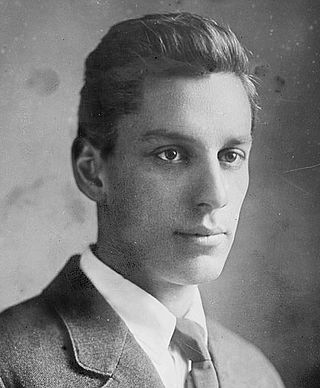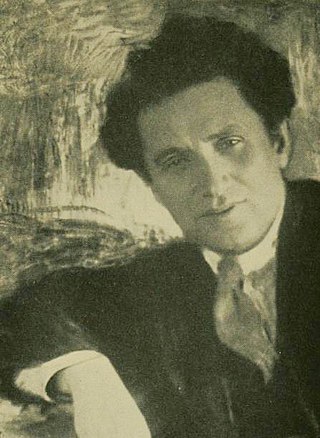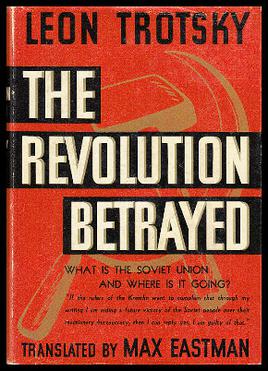
Lev Davidovich Bronstein, better known as Leon Trotsky, was a Russian revolutionary, Soviet politician, and political theorist. He was a central figure in the 1905 Revolution, October Revolution, Russian Civil War, and establishment of the Soviet Union. Trotsky, with Vladimir Lenin, was widely considered one of the two most prominent Soviet figures and was de facto second-in-command during the early years of the Russian Soviet Republic. Ideologically a Marxist and a Leninist, his thought and writings inspired a school of Marxism known as Trotskyism.

Leninism is a political ideology developed by Russian Marxist revolutionary Vladimir Lenin that proposes the establishment of the dictatorship of the proletariat led by a revolutionary vanguard party as the political prelude to the establishment of communism. Lenin's ideological contributions to the Marxist ideology relate to his theories on the party, imperialism, the state, and revolution. The function of the Leninist vanguard party is to provide the working classes with the political consciousness and revolutionary leadership necessary to depose capitalism.

The Russian Revolution was a period of political and social change in Russia, starting in 1917. This period saw Russia abolish its monarchy and adopt a socialist form of government following two successive revolutions and a bloody civil war. The Russian Revolution can also be seen as the precursor for the other European revolutions that occurred during or in the aftermath of World War I, such as the German Revolution of 1918–1919.

Stalinism is the totalitarian means of governing and Marxist–Leninist policies implemented in the Soviet Union (USSR) from 1927 to 1953 by dictator Joseph Stalin. Stalin had previously made a career as a gangster and robber, working to fund revolutionary activities, before eventually becoming General Secretary of the Soviet Union. Stalinism included the creation of a one man totalitarian police state, rapid industrialization, the theory of socialism in one country, forced collectivization of agriculture, intensification of class conflict, a cult of personality, and subordination of the interests of foreign communist parties to those of the Communist Party of the Soviet Union, which Stalinism deemed the leading vanguard party of communist revolution at the time. After Stalin's death and the Khrushchev Thaw, a period of de-Stalinization began in the 1950s and 1960s, which caused the influence of Stalin's ideology to begin to wane in the USSR.

Trotskyism is the political ideology and branch of Marxism developed by Russian revolutionary and intellectual Leon Trotsky along with some other members of the Left Opposition and the Fourth International. Trotsky described himself as an orthodox Marxist, a revolutionary Marxist, and a Bolshevik–Leninist as well as a follower of Karl Marx, Frederick Engels, Vladimir Lenin, Karl Liebknecht, and Rosa Luxemburg. Assessing Trotsky, Lenin wrote: "Trotsky long ago said that unification is impossible. Trotsky understood this and from that time on, there has been no better Bolshevik."

The ten years 1917–1927 saw a radical transformation of the Russian Empire into a socialist state, the Soviet Union. Soviet Russia covers 1917–1922 and Soviet Union covers the years 1922 to 1991. After the Russian Civil War (1917–1923), the Bolsheviks took control. They were dedicated to a version of Marxism developed by Vladimir Lenin. It promised the workers would rise, destroy capitalism, and create a socialist society under the leadership of the Communist Party of the Soviet Union. The awkward problem, regarding Marxist revolutionary theory, was the small proletariat, in an overwhelmingly peasant society with limited industry and a very small middle class. Following the February Revolution in 1917 that deposed Nicholas II of Russia, a short-lived provisional government gave way to Bolsheviks in the October Revolution. The Bolshevik Party was renamed the Russian Communist Party (RCP).
Bolshevism is a revolutionary socialist current of Soviet Leninist and later Marxist–Leninist political thought and political regime associated with the formation of a rigidly centralized, cohesive and disciplined party of social revolution, focused on overthrowing the existing capitalist state system, seizing power and establishing the "dictatorship of the proletariat".

The Communist International (Comintern), also known as the Third International, was an international organization founded in 1919 that advocated world communism, and which was led and controlled by the Communist Party of the Soviet Union. The Comintern resolved at its Second Congress in 1920 to "struggle by all available means, including armed force, for the overthrow of the international bourgeoisie and the creation of an international soviet republic as a transition stage to the complete abolition of the state". The Comintern was preceded by the dissolution of the Second International in 1916. Vladimir Lenin and Leon Trotsky were both honorary presidents of the Communist International.

Lenin's Testament is a document dictated by Vladimir Lenin in late 1922 and early 1923. In the testament, Lenin proposed changes to the structure of the Soviet governing bodies. Sensing his impending death, he also gave criticism of Bolshevik leaders Zinoviev, Kamenev, Trotsky, Bukharin, Pyatakov, and Stalin. He warned of the possibility of a split developing in the party leadership between Trotsky and Stalin if proper measures were not taken to prevent it. In a post-script he also suggested Joseph Stalin be removed from his position as General Secretary of the Russian Communist Party's Central Committee. Although there are some historical questions regarding the document's origins, the majority view is that the document was authored by Lenin.

Ten Days That Shook the World (1919) is a book by the American journalist and socialist John Reed. Here, Reed presented a firsthand account of the 1917 Russian October Revolution. Reed followed many of the most prominent Bolsheviks closely during his time in Russia.
Socialist democracy is a political system that aligns with principles of both socialism and democracy. It includes ideologies such as council communism, democratic socialism, social democracy, and soviet democracy, as well as Marxist democracy like the dictatorship of the proletariat. It was embodied in the Soviet system (1922–1991). It can also denote a system of political party organization like democratic centralism, or a form of democracy espoused by Marxist–Leninist political parties or groups that support one-party states. The Socialist Federal Republic of Yugoslavia (1945–1992) styled itself a socialist democracy, as did the People's Republic of Bulgaria (1946–1990) and the Socialist Republic of Romania (1947–1989).

Joseph Stalin started his career as a robber, gangster as well as an influential member and eventually the leader of the Bolshevik faction of the Russian Social Democratic Labour Party. He served as the General Secretary of the Central Committee of the Communist Party of the Soviet Union from 1922 until his death in 1953.

Aleksandr Konstantinovich Voronsky was a prominent humanist Marxist literary critic, theorist and editor of the 1920s, disfavored and purged in 1937 for his work with the Left Opposition and Leon Trotsky during and after the October Revolution. Voronsky's writings were hidden away in the Soviet Union, until his autobiography, Waters of Life and Death, and anthology, Art as the Cognition of Life were translated and published in English.
Mehring Books is the publishing house of the International Committee of the Fourth International. In addition to putting out its own titles, it maintains an online storefront selling historical works of the socialist movement.

Max Forrester Eastman was an American writer on literature, philosophy and society, a poet and a prominent political activist. Moving to New York City for graduate school, Eastman became involved with radical circles in Greenwich Village. He supported socialism and became a leading patron of the Harlem Renaissance and an activist for a number of liberal and radical causes. For several years, he edited The Masses. With his sister Crystal Eastman, he co-founded in 1917 The Liberator, a radical magazine of politics and the arts.

History of the Russian Revolution is a three-volume book by Leon Trotsky on the Russian Revolution of 1917. The first volume is dedicated to the political history of the February Revolution and the October Revolution, to explain the relations between these two events. The book was initially published in Germany in 1930. It was originally published in Russian, but it was translated into English by Max Eastman in 1932. The English translation of the second volume, originally consisting of two parts, is split into two volumes. The book was considered anti-stalinist in the Soviet Union and was not published in Russia until 1997.

Grigory Yevseyevich Zinoviev was a Russian revolutionary and Soviet politician. A prominent Old Bolshevik, Zinoviev was Vladimir Lenin's closest associate prior to 1917 and a leading government figure in the early Soviet Union, serving as chairman of the Communist International (Comintern) from 1919 to 1926.
The Left Opposition was a faction within the Russian Communist Party (Bolsheviks) from 1923 to 1927 headed de facto by Leon Trotsky. The Left Opposition was formed by Trotsky to mount a struggle against the bureaucratic degeneration that began within the party leadership headed by Stalin during the serious illness of the Bolshevik founder Vladimir Lenin. The degeneration intensified after Lenin's death in January 1924. The Left Opposition advocated for a programme of rapid industrialization, voluntary collectivisation of agriculture, and the expansion of a worker's democracy.

The Revolution Betrayed: What is the Soviet Union and Where is it Going? is a book published in 1936 by the exiled Soviet leader Leon Trotsky. This work analyzed and criticized the course of historical development in the Soviet Union following the death of Vladimir Lenin in 1924 and is regarded as Trotsky's primary work dealing with the nature of Stalinism. The book was written by Trotsky during his exile in Norway and was originally translated into Spanish by Victor Serge. The most widely available English translation is by Max Eastman.
Permanent revolution is the strategy of a revolutionary class pursuing its own interests independently and without compromise or alliance with opposing sections of society. As a term within Marxist theory, it was first coined by Karl Marx and Friedrich Engels as early as 1850, but since then different theorists - most notably Leon Trotsky (1879-1940) - have used the phrase to refer to different concepts.















